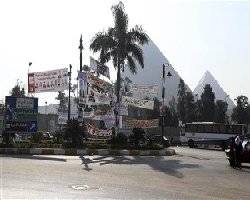Egyptians in nine provinces have begun voting in the second stage of the first parliamentary elections since a popular uprising toppled former president Hosni Mubarak in February.
Dozens of people were lining up under campaign posters outside a school near the Pyramids in Giza, Cairo's twin city, early on Wednesday, waiting to cast their ballots and dip their finger in purple ink to prevent double voting.
Other areas were voting is under way are Beni Sueif south of the capital; the Nile Delta provinces of Menufiya, Sharqiya and Beheira; the canal cities of Ismailiya and Suez and the southern cities Sohag and Aswan.
Islamist parties dominated the first round of voting which started last month, with the Muslim Brotherhood's political arm taking 47 per cent of the contested seats and al-Nour party taking 21 per cent. The liberal Egyptian Bloc took nine per cent.
Al Jazeera's Rawya Rageh reported from a polling station in Giza, on the outskirts of Cairo, that the turnout had been steady for the first hour since the polls had opened, although the turnout did not appear to be as high as in the first round of voting.
She said round two was likely to be a much tougher race than the previous round, especially in the Muslim Brotherhood's heartland, the Nile Delta.
"This is going to be a very important test, especially for the liberals … Will they be able to make a comeback?" Rageh said. "For the first time, we’ve seen the liberals come together in a semi-formal co-ordination [in the lead-up to the second round]."
The second round, which continues through Thursday, will decide 180 seats in the 498-seat lower house. The third and final round is scheduled for early January.
Some 18.8 million Egyptians are eligible to cast their ballots with voting taking place over two days followed by run-off votes where necessary a week later.
Voters are required to cast three ballots: two for individual candidates and one for a party or coalition, in the assembly's 498 seats.
The Muslim Brotherhood had been widely forecast to triumph as the country's most organized political group, well known after decades of charitable work and its endurance through repeated crackdowns by the Mubarak regime.
Much remains unclear about how the new parliament will function and whether it will be able to resolve a stand-off with the armed forces over how much power they will retain under a new constitution to be written next year.
After the voting for the lower house of parliament, which will end in January, Egyptians will then elect an upper house in a further three rounds of polls.
PHOTO CAPTION
Electoral posters line the streets near the pyramids of Giza, southwest of Cairo December 13, 2011.
Al-Jazeera

 Hajj virtues
Hajj virtues